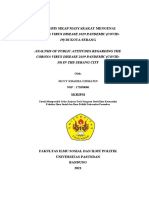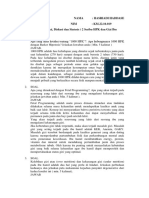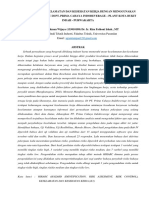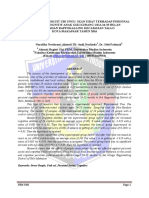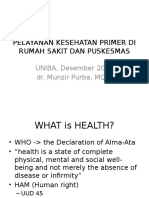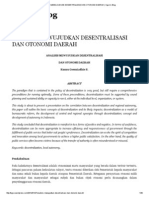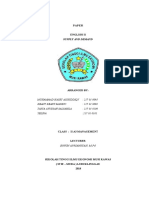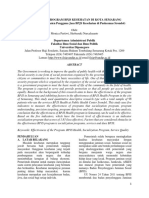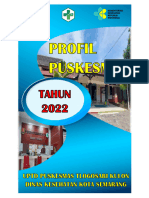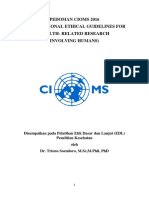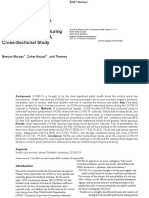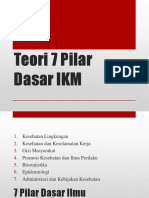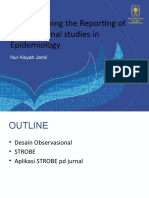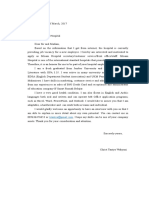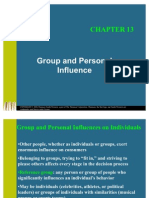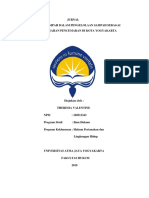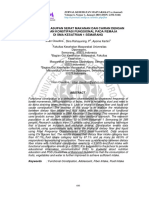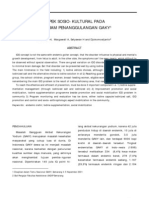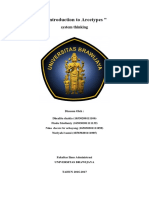Skill 2
Skill 2
Uploaded by
Aki0 ratings0% found this document useful (0 votes)
75 views3 pagesThe document discusses choosing answers with synonyms for key words in short dialogues on the TOEFL test. It provides an example dialogue where the man says he is "feeling rather sick" and the correct answer choice is a synonym for this, saying he is "not feeling very well." The document advises focusing on key words in the last line of dialogues and choosing answers that contain synonyms for those key words.
Original Description:
Original Title
SKILL 2
Copyright
© © All Rights Reserved
Available Formats
PDF, TXT or read online from Scribd
Share this document
Did you find this document useful?
Is this content inappropriate?
Report this DocumentThe document discusses choosing answers with synonyms for key words in short dialogues on the TOEFL test. It provides an example dialogue where the man says he is "feeling rather sick" and the correct answer choice is a synonym for this, saying he is "not feeling very well." The document advises focusing on key words in the last line of dialogues and choosing answers that contain synonyms for those key words.
Copyright:
© All Rights Reserved
Available Formats
Download as PDF, TXT or read online from Scribd
Download as pdf or txt
0 ratings0% found this document useful (0 votes)
75 views3 pagesSkill 2
Skill 2
Uploaded by
AkiThe document discusses choosing answers with synonyms for key words in short dialogues on the TOEFL test. It provides an example dialogue where the man says he is "feeling rather sick" and the correct answer choice is a synonym for this, saying he is "not feeling very well." The document advises focusing on key words in the last line of dialogues and choosing answers that contain synonyms for those key words.
Copyright:
© All Rights Reserved
Available Formats
Download as PDF, TXT or read online from Scribd
Download as pdf or txt
You are on page 1of 3
SKILL 2: CHOOSE ANSWERS WITH SYNONYMS
Often the correct answer in a short dialogue is an answer that contains
synonyms (words with similar meanings but different sounds) for key words
in the conversation.
SKILL 2: CHOOSE ANSWERS WITH SYNONYMS
Example from the TOEFL Tests
On the recording, you hear:
(woman) How are you feeling today?
(man) I’m really feeling rather sick.
(narrator) What does the woman assume Steve did?
In your test book or on the computer screen, you read:
(A) He’s not feeling very well.
(B) He’s rather sick of working..
(C) He’s feeling better today than yesterday.
(D) He’d
In this reallythe
dialogue, rather not answer
key word the question.
feeling rather sick refers to not feeling very well. The best
answer to this question is therefore answer (A).
SKILL 2: CHOOSE ANSWERS WITH SYNONYMS
The following chart outlines a very important strategy for short dialogues:
STRATEGY 2: CHOOSE ANSWERS WITH SYNONYMS
1. As you listen to the last line of the dialogue, focus on key words in that line.
2. If you see any synonyms for key words in a particular answer, then you have probably
found the correct answer.
You might also like
- SKRIPSI (1-3) - DikonversiDocument65 pagesSKRIPSI (1-3) - DikonversirianNo ratings yet
- TUGAS Prof. VENI Sms II Tugas RDS 2Document5 pagesTUGAS Prof. VENI Sms II Tugas RDS 2risaldi.akisman22091996No ratings yet
- Program Studi Teknik Industri, Fakultas Teknik, Universitas Pasundan EmailDocument13 pagesProgram Studi Teknik Industri, Fakultas Teknik, Universitas Pasundan EmailFarid MuhamadNo ratings yet
- Internasional Pendidikan PancasilaDocument6 pagesInternasional Pendidikan PancasilaAlbert MatondangNo ratings yet
- Implementasi Metode Penalaran CBR Dalam Mengidentifikasi Gejala Awal Penyakit Jantung Menggunakan Algoritma Sorensen CoeffientDocument8 pagesImplementasi Metode Penalaran CBR Dalam Mengidentifikasi Gejala Awal Penyakit Jantung Menggunakan Algoritma Sorensen CoeffientJurnal JTIK (Jurnal Teknologi Informasi dan Komunikasi)No ratings yet
- Kenakalan Remaja Yang Mengkonsumsi Minum - Minuman Keras Studi Kasus Di Kampung Pasar 60 Nagari Tapan Kabupaten Pesisir SelatanDocument8 pagesKenakalan Remaja Yang Mengkonsumsi Minum - Minuman Keras Studi Kasus Di Kampung Pasar 60 Nagari Tapan Kabupaten Pesisir Selatannatasha irmayuniNo ratings yet
- Jurnal Biskuit Ubi Ungu Ikan SidatDocument12 pagesJurnal Biskuit Ubi Ungu Ikan SidatYayu Angriani100% (1)
- Pelayanan Kesehatan Primer Di Rumah Sakit Dan PuskesmasDocument14 pagesPelayanan Kesehatan Primer Di Rumah Sakit Dan PuskesmasMardoni EfrijonNo ratings yet
- Analisis Mewujudkan Desentralisasi Dan Otonomi Daerah - Kgsc's BlogDocument30 pagesAnalisis Mewujudkan Desentralisasi Dan Otonomi Daerah - Kgsc's Blogmbelgedeshu0% (2)
- Bahasa Inggris IIDocument15 pagesBahasa Inggris IIMuhammad Hasby AsshiddiqyNo ratings yet
- Jurnal Sistem Politik IndonesiaDocument20 pagesJurnal Sistem Politik IndonesiaMeutia AnggrainiNo ratings yet
- ID Implementasi Program Bpjs Kesehatan Di PDocument12 pagesID Implementasi Program Bpjs Kesehatan Di PmarianaNo ratings yet
- BPJS KesehatanDocument11 pagesBPJS Kesehatanjumaidi ratna100% (1)
- Etika Pancasila Edited 2nd AgainDocument14 pagesEtika Pancasila Edited 2nd AgainNikenAlimahNo ratings yet
- Contoh Makalah Ilmu NegaraDocument209 pagesContoh Makalah Ilmu NegaraStefanus Putu Pratama IINo ratings yet
- Oleh: Monica Pertiwi, Herbasuki NurcahyantoDocument14 pagesOleh: Monica Pertiwi, Herbasuki NurcahyantoDhea Eka AnggraeniNo ratings yet
- ID Pengarusutamaan Kesehatan Lingkungan DalDocument12 pagesID Pengarusutamaan Kesehatan Lingkungan Dalsyamsul arifin0909No ratings yet
- Makalah Pronoun: Bahasa InggrisDocument12 pagesMakalah Pronoun: Bahasa InggrisSindy NusiNo ratings yet
- Kode EtikDocument10 pagesKode EtikResikaNo ratings yet
- Contoh Program Kemitraan Di Bidang Kesehatan: Kelompok 2Document10 pagesContoh Program Kemitraan Di Bidang Kesehatan: Kelompok 2ana7No ratings yet
- Makalah Bahasa Inggris OkDocument29 pagesMakalah Bahasa Inggris OkAndrew100% (1)
- Profil Puskesmas TH 2022Document50 pagesProfil Puskesmas TH 2022Ashiung HelsinsNo ratings yet
- Pedoman CIOMS 2016 FixDocument85 pagesPedoman CIOMS 2016 FixHandiniNo ratings yet
- Skripsi Tanpa Bab Pembahasan PDFDocument80 pagesSkripsi Tanpa Bab Pembahasan PDFDindin Fachrudin MarufNo ratings yet
- Fiqh Finish FC 40Document17 pagesFiqh Finish FC 40Anonymous 441OXji69z100% (1)
- Akk Jurnal Internasional 1Document7 pagesAkk Jurnal Internasional 1Onnii SltrNo ratings yet
- Teori 7 Pilar Dasar IKMDocument41 pagesTeori 7 Pilar Dasar IKMIntan Putri Wirahana ShantyNo ratings yet
- StrobeDocument48 pagesStrobethe doctorNo ratings yet
- Artikel Bahasa Inggris Tentang Kesehatan - Docx SeptianDocument2 pagesArtikel Bahasa Inggris Tentang Kesehatan - Docx Septianwidy_haidaNo ratings yet
- Cover Letter Siloam HospitalDocument1 pageCover Letter Siloam HospitalChrist Tantya WahyuniNo ratings yet
- Peran Dan Fungsi Masjid Untuk Kesejahteraan Umat-1Document3 pagesPeran Dan Fungsi Masjid Untuk Kesejahteraan Umat-1TriNo ratings yet
- Group and Personal InfluenceDocument51 pagesGroup and Personal InfluenceBinish NidaNo ratings yet
- JURNALDocument13 pagesJURNALAchmad KomardaniNo ratings yet
- TUGAS 3 (Risna Ruslan 1B)Document8 pagesTUGAS 3 (Risna Ruslan 1B)Iis RisnaNo ratings yet
- PENGELOLAAN CITRA POLITIK PRABOWO Kelar Cuy-1 UPDocument9 pagesPENGELOLAAN CITRA POLITIK PRABOWO Kelar Cuy-1 UPSyeefaNo ratings yet
- Hubungan Asupan Serat Makanan Dan Cairan Dengan Kejadian Konstipasi Fungsional Pada Remaja Di Sma Kesatrian 1 SemarangDocument10 pagesHubungan Asupan Serat Makanan Dan Cairan Dengan Kejadian Konstipasi Fungsional Pada Remaja Di Sma Kesatrian 1 SemarangHanifNo ratings yet
- Jurnal GAKYDocument8 pagesJurnal GAKYPambudi Bekti PratiwiNo ratings yet
- Artikel IlmiahDocument16 pagesArtikel IlmiahGilank RamadhanNo ratings yet
- Hbse CultureDocument37 pagesHbse Culturegoest thea100% (1)
- Jurnal Sinta 1-6 Musvira Mustafa - Po713201191120 - 2CDocument7 pagesJurnal Sinta 1-6 Musvira Mustafa - Po713201191120 - 2CAswar AnasNo ratings yet
- Makalah EnglishDocument14 pagesMakalah EnglishMike PutriNo ratings yet
- Sistem KesehatanDocument8 pagesSistem KesehatanDian WidyaningtyasNo ratings yet
- Makalah: Mata Kuliah Bahasa Inggris " Parts of Speech "Document10 pagesMakalah: Mata Kuliah Bahasa Inggris " Parts of Speech "M FAIZUL MUTTAQIINNo ratings yet
- (J) Bimbingan Kelompok Teknik Sosiodrama Untuk Meningkatkan Interaksi Sosial Dengan Teman SebayaDocument14 pages(J) Bimbingan Kelompok Teknik Sosiodrama Untuk Meningkatkan Interaksi Sosial Dengan Teman SebayaBhima Agung NugrahaNo ratings yet
- 7 Stars DoctorDocument2 pages7 Stars DoctorCynthia Yupa100% (1)
- Tugas Bahasa Inggris Part of SpeechDocument4 pagesTugas Bahasa Inggris Part of Speechiqbal0% (1)
- Konsep Dan Batasan Kesehatan LingkunganDocument30 pagesKonsep Dan Batasan Kesehatan LingkunganBrigita NatashaNo ratings yet
- Lesson 2 Incomplete Adjective ClausesDocument15 pagesLesson 2 Incomplete Adjective ClausesNopa AfrizalNo ratings yet
- Artikel Bahasa Inggris Tentang Kesehatan Artinya TerbaruDocument5 pagesArtikel Bahasa Inggris Tentang Kesehatan Artinya Terbaruahwandi riswantoNo ratings yet
- Epidemiologi Molekuler 01Document13 pagesEpidemiologi Molekuler 01Nesa nazla SilviaNo ratings yet
- Introduction To Arcetypes (Makalah)Document9 pagesIntroduction To Arcetypes (Makalah)Finda Frisdianty0% (1)
- Politik Hukum Otonomi Daerah Dalam Mewuj 5536a6d8Document19 pagesPolitik Hukum Otonomi Daerah Dalam Mewuj 5536a6d8FHANDY ARSO SLAMET FHANDYNo ratings yet
- Exercise 1 - Ayu AnggitaDocument3 pagesExercise 1 - Ayu AnggitaAyu AnggitaNo ratings yet
- 1 Implementasi Ibadah HajiDocument16 pages1 Implementasi Ibadah HajiAnonymous HHBUXj45VNo ratings yet
- 7017 37 17395 1 10 20180730 PDFDocument16 pages7017 37 17395 1 10 20180730 PDFLèlŷNo ratings yet
- Ispa, AntibiotikDocument5 pagesIspa, AntibiotikUser LenovoNo ratings yet
- Modul I Toefl ListeningDocument9 pagesModul I Toefl ListeningMaeNo ratings yet
- Toefl PBT TestDocument34 pagesToefl PBT TestMonica Jazmin Olivera AguirreNo ratings yet
- Modul Toefl 2021Document96 pagesModul Toefl 2021Biyan 1234No ratings yet
- Grammar Rules Made Funny (1): How to Improve Your Spoken and Written American Business EnglishFrom EverandGrammar Rules Made Funny (1): How to Improve Your Spoken and Written American Business EnglishNo ratings yet
